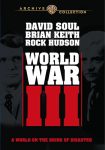World War III is an American television miniseries, directed by Boris Sagal and David Greene and first broadcast in 1982. It stars David Soul as Colonel Jake Caffey, Rock Hudson as President Thomas McKenna, Brian Keith as Soviet leader Gorny and Cathy Lee Crosby as Major Kate Breckenridge. Running for three and a half hours over two nights, World War III depicted a fictitious conflict initiated by Soviet troops against the United States. The catalyst for this attack is the 1980 grain embargo of the Soviet Union, imposed by Western nations in retaliation for the Afghanistan invasion. The embargo has caused food shortages and political unrest inside the Soviet Union. Hardliners in the Soviet military and KGB, acting without the knowledge of the Kremlin, order Russian commandos into Alaska. Their objective is to capture the Trans-Alaska Pipeline, which provides the US with millions of barrels of oil. They believe that Washington will lift the grain embargo if oil supplies to the US are jeopardised.
Several dozen Soviet paratroopers land and begin their mission. With severe weather preventing conventional forces from reaching the area, the Soviets are engaged by Alaskan National Guardsmen commanded by Colonel Caffey. Meanwhile, US president McKenna and Soviet leader Gorny begin to mobilise their military forces, despite both men wanting to avoid a full-scale war. As the Soviet troops attack a pumping station in Alaska, McKenna and Gorny hold secret peace talks in Iceland. Their efforts to maintain peace are thwarted when Gorny is assassinated by militant KGB agents. President McKenna learns that Gorny is dead and the Soviets in Alaska have captured the pipeline. Soviet coup leaders launch a full nuclear strike, which is reciprocated by McKenna.
The shooting of World War III was marred from the outset by the death of director Boris Sagal, who was killed after walking into helicopter rotors. The series was neither a commercial success nor critically popular. Political commentators and television critics condemned its cartoonish portrayal of the Soviets, who shoulder almost all of the blame for starting the eponymous World War III. The invasion scenario is unlikely, as are its battle scenes. Nevertheless World War III does reference actual events and conditions, such as the 1980 grain embargo and the stagnating Soviet economy. It provides a fictional but plausible example of Cold War brinkmanship, Soviet political instability and factors that might have triggered a third world war.
Content on this page is © Alpha History 2018-23. Content created by Alpha History may not be copied, republished or redistributed without our express permission. For more information please refer to our Terms of Use.

